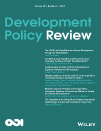External publications

‘Donorship' and strategic policymaking: Germany's MENA aid programme since the Arab uprisings
Furness, MarkExternal Publications (2019)
in: Development Policy Review 38 (S1), 070-090
DOI: https://doi.org/10.1111/dpr.12461
Open access
Germany's official aid to Middle Eastern and North African (MENA) countries has more than doubled since 2011, ostensibly to support their own responses to development and humanitarian challenges following the Arab uprisings. The dramatic increases in aid have not been accompanied by a public strategy setting out Germany's objectives in the region, and the role of aid in conjunction with other policy tools in achieving them. What strategic objectives does the German government have for its MENA aid, and have these objectives changed in response to the Arab uprisings? Does the practice of Germany's aid spending actually address development and humanitarian challenges in the MENA region, as these are defined by MENA countries themselves? In order to address these questions, this article develops key insights from the historical institutionalist and aid effectiveness literature that explain strategic policymaking in complex decision‐making systems. Two propositions are discussed in a structured review of the policy and practice dimensions of Germany's MENA aid programme: first, that Germany's aid and foreign policy system has not been able to articulate a clear strategy due to political differences and bureaucratic inertia; and second that the priorities tend to favour German and European security interests rather than the region's own development and humanitarian priorities. The analysis reveals that while new priorities for development cooperation in response to the Arab uprisings have been set, Germany's MENA aid programme shows signs of policy incoherence and fragmentation. This is unlikely to change without a ‘whole‐of‐government' strategy for Germany's MENA engagement. Furthermore, while there is little evidence of purposeful securitisation of aid, short‐term stability has been privileged over support for political change. A whole‐of‐government strategy based on the Sustainable Development Goals could balance German interests with the MENA region's development priorities, iron out the most problematic incoherencies, and thereby increase partner country ownership.
Contact
Cornelia Hornschild
Publication Coordinator
E-mail Cornelia.Hornschild@idos-research.de
Phone +49 (0)228 94927-135
Fax +49 (0)228 94927-130
Alexandra Fante
Librarian/ Open Access Coordinator
E-Mail Alexandra.Fante@idos-research.de
Telefon +49 (0)228 94927-321
Fax +49 (0)228 94927-130



![[Translate to English:] Photo: Alexandra Fante, Bibliothekarin/Open Access-Koordinatorin](/fileadmin/_processed_/f/0/csm__c_Deutsches-Institut-fuer-Entwicklungspolitik_Fante_94ce4fa1ba.jpg)